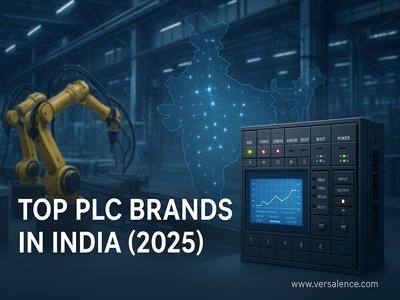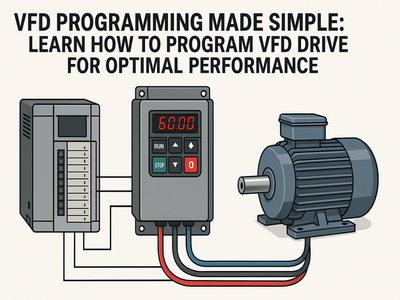In 2025, the industrial landscape is undergoing a revolutionary transformation, and smart sensors are at the forefront of this evolution. As a vital component of Industrial IoT (IIoT), smart sensors have redefined how industries operate, bringing unprecedented levels of efficiency, automation, and precision. Let’s delve into how these innovative devices are shaping the future of industrial automation.
What Are Smart Sensors?
Smart sensors are advanced devices capable of detecting and measuring physical parameters such as temperature, pressure, humidity, vibration, and more. Unlike traditional sensors, smart sensors go beyond mere data collection. They integrate processing power, communication capabilities, and analytics to provide actionable insights directly from the source.
In essence, smart sensors are not just data collectors; they are intelligent systems that bridge the gap between the physical and digital worlds, enabling industries to harness the full potential of IoT.
The Role of Smart Sensors in Industrial IoT
Smart sensors are the backbone of Industrial IoT systems, driving automation, real-time decision-making, and operational efficiency. Here are the key roles they play:
- Data Collection and Processing
Smart sensors continuously monitor industrial processes, capturing data in real time. They process this data at the edge, reducing latency and enabling faster decision-making. For example, in manufacturing, smart sensors can detect temperature fluctuations in machinery and trigger immediate corrective actions. - Seamless Communication
With built-in connectivity, smart sensors communicate seamlessly with IoT platforms, edge devices, and cloud systems. They use communication protocols like MQTT, Zigbee, and 5G to ensure uninterrupted data flow across industrial networks. - Enhanced Automation
By integrating with machine learning algorithms and AI, smart sensors enable advanced automation. Predictive maintenance, self-optimizing production lines, and autonomous quality control are now a reality, thanks to these devices.
Key Benefits of Smart Sensors in 2025
- Real-Time Monitoring
Smart sensors provide continuous monitoring of industrial equipment and processes. Real-time alerts and insights help industries prevent costly downtime and optimize operations. - Predictive Maintenance
One of the most significant impacts of smart sensors is their role in predictive maintenance. By analyzing data patterns, these sensors can predict equipment failures before they occur, saving time and reducing maintenance costs. - Improved Energy Efficiency
Energy consumption is a major concern in industries. Smart sensors monitor energy usage and identify inefficiencies, allowing companies to adopt more sustainable practices. - Enhanced Safety
In hazardous environments, smart sensors play a crucial role in ensuring worker safety. For instance, they can detect gas leaks, monitor air quality, or alert operators to dangerous temperature levels. - Cost Optimization
By enabling precision in operations, minimizing downtime, and reducing waste, smart sensors significantly lower operational costs for industries.
Top Applications of Smart Sensors in Industrial IoT
- Manufacturing
Smart sensors enable precision manufacturing by monitoring parameters such as vibration, temperature, and pressure in real-time. They ensure product quality while reducing production errors. - Supply Chain and Logistics
Sensors track goods across the supply chain, providing real-time location updates, temperature control for perishables, and condition monitoring during transit. - Energy and Utilities
In the energy sector, smart sensors optimize power generation, monitor grid performance, and ensure efficient energy distribution. - Healthcare
Smart sensors in IoT-enabled medical devices ensure the accuracy of readings, remote patient monitoring, and real-time diagnostics in industrial healthcare facilities. - Oil and Gas
In the oil and gas industry, smart sensors detect leaks, monitor pipeline integrity, and ensure safety in drilling operations.
The Role of Aknitech Automation in Smart Sensor Integration
Aknitech Automation is a leading innovator in the field of industrial automation and IoT integration. By incorporating cutting-edge smart sensors into their solutions, Aknitech empowers industries to unlock the full potential of IIoT.
Whether it’s optimizing manufacturing lines, enhancing predictive maintenance strategies, or ensuring compliance with safety standards, Aknitech Automation leverages smart sensor technology to deliver unparalleled efficiency and productivity.
Future Trends in Smart Sensors for IIoT
As we look ahead, smart sensors are expected to evolve further, aligning with emerging technologies:
- AI-Driven Sensors
The integration of artificial intelligence will make sensors more intelligent, enabling autonomous decision-making and self-learning capabilities. - 5G-Powered Connectivity
With the widespread adoption of 5G, smart sensors will experience faster data transmission and enhanced network reliability, making real-time monitoring even more effective. - Miniaturization
Sensors will become smaller and more versatile, allowing their integration into compact and intricate industrial systems. - Blockchain for Security
Blockchain technology will be incorporated to secure sensor data, ensuring transparency and protection against cyber threats. - Sustainability-Focused Sensors
Smart sensors will contribute to green initiatives by focusing on energy efficiency and sustainable industrial practices.
Challenges and Solutions
While smart sensors bring immense benefits, they also come with challenges:
- High Initial Costs
Smart sensors can be expensive to deploy at scale. However, their long-term ROI in terms of efficiency and cost savings justifies the investment. - Data Privacy Concerns
As sensors collect vast amounts of data, ensuring data privacy and security is crucial. Advanced encryption and secure communication protocols address these concerns. - Interoperability Issues
With a variety of sensor manufacturers, ensuring compatibility between devices can be challenging. Standardization efforts are helping overcome this hurdle.
Conclusion
Smart sensors are transforming industrial IoT, making processes smarter, faster, and more efficient. As we move deeper into 2025, their integration into industrial systems continues to grow, unlocking new possibilities for automation, safety, and sustainability.
Aknitech Automation stands as a leader in leveraging smart sensor technology to empower industries. By addressing challenges and embracing innovations, they ensure businesses remain competitive in the ever-evolving landscape of industrial automation.
With advancements in AI, 5G, and edge computing, the role of smart sensors will only expand, solidifying their position as a cornerstone of Industrial IoT.







